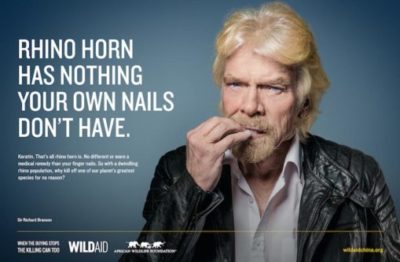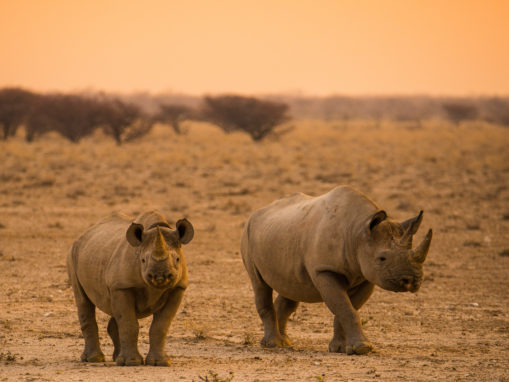
In recent years, few species have faced a greater threat from poaching and the illegal wildlife trade than the magnificent rhino. After wild populations in Africa enjoyed a few years of relative safety, the number of animals brutally murdered for their horns has increased dramatically lately. In 2014, more than 1200 rhinos were killed in South Africa alone. First estimates for 2015 don’t look much better.
Most of this spike in wildlife crime is driven by increased consumer demand in China and Vietnam, where rhino horn is used primarily as a remedy for all sorts of ailments, even though it has long been shown that it doesn’t have any medicinal properties whatsoever. It’s a sad story of superstition and misinformation on one end of the chain that is responsible for mass slaughter and suffering on the other.
I’ve long argued that the illegal wildlife trade must be addressed along the entire supply chain. Strengthening the capabilities of those brave rangers fighting what looks like a losing battle in many of Africa’s national parks is part of the solution, and it has to go hand in hand with better governance, greater accountability, and more effective law enforcement. Yet, supply reduction can only work when we tackle demand at the same time. In other words: only when the buying stops, the killing can, too.
This is one of the reasons I went to visit Vietnam in September last year and met with local business leaders and other stakeholders. Our conversations about wildlife and the role of Vietnamese business in ending this madness were productive and fruitful. Over dinner, several dozen business leaders pledged to start a movement to end the use of rhino horn once and for all.
Continue reading via Virgin.com…
MORE ON THE “NAIL BITERS” CAMPAIGN:
With rampant poaching threatening the survival of Africa’s rhinos, an all-star team of Chinese celebrities and global wildlife ambassadors led by Sir Richard Branson is speaking out against the sale of rhino horn — by chewing on their own fingernails.
Why? Rhino horn is primarily made of keratin, a protein also found in human nails and hair. In recent years, international 

The celebrities in the new Mandarin- and English-language campaign from WildAid and African Wildlife Foundation put to rest such claims. “Keratin. That’s all it is. No different or more a medical remedy than your fingernails,” WildAid ambassador Sir Richard Branson, Founder of the Virgin Group, said of rhino horn. “So with a dwindling rhino population, why kill off one of our planet’s greatest species for no reason?”
Mr. Branson is joined in the new campaign by Vietnamese-American actress and WildAid Wildlife Champion of the Year Maggie Q; Li Bingbing, China’s top actress; and Chinese celebrities such as actor/singer Jing Boran, fashion photographer Chen Man and actor Chen Kun.
A Vietnamese version of the “Nail Biters” campaign starring some of the nation’s biggest celebrities is also underway. Vietnam is the world’s largest rhino horn market and the focus of a multiyear effort by WildAid and African Wildlife Foundation to educate consumers and persuade them not to buy, gift or consume rhino horn.
“Nail Biters” with Sir Richard Branson | WildAid and African Wildlife Foundation from WildAid on Vimeo.
Stay in touch and get the latest WildAid updates.
SIGN UP